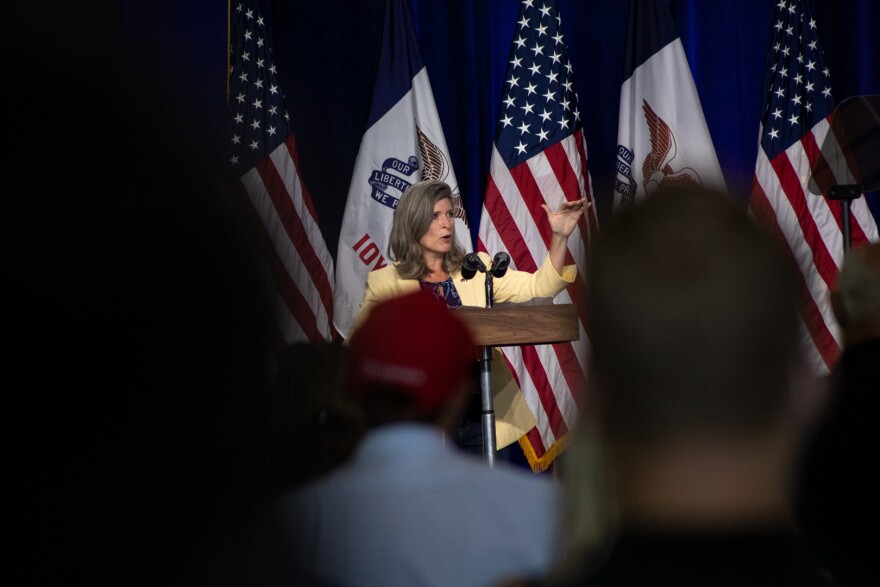Iowa’s Republican U.S. Sen Joni Ernst is fighting to hang onto her seat as Democrats see it as a potential pick up in November. Her Democratic challenger, real estate executive Theresa Greenfield, is running ads attacking Ernst for not being more forceful with the Trump administration and its handling of the state’s biofuels industry.
Last week, Greenfield toured Western Iowa Energy in Wall Lake. The biodiesel plant started production in 2006 and is capable of producing 30 million gallons of Biodiesel a year. After she toured the plant, Greenfield asked its President and General Manager, Brad Wilson, how the country could grow the biodiesel industry.
“How to really help it out is to stop the small refinery waivers,” Wilson told Greenfield as they stood outside the northwest Iowa plant. “I’m sure you’ve heard of what the EPA is doing in granting those waivers.”
“I’m sure you’ve heard my ads,” Greenfield replied with a chuckle.
The two are talking about a federal program, known as the Renewable Fuel Standard, that requires oil companies to blend billions of gallons of biofuels into the nation’s fuel supply. These biofuels are made from crops like corn and soybeans. Oil companies are allowed to request waivers if complying with the RFS would create financial hardship. The Trump administration has doled out dozens of them, including to some of the world’s largest oil companies. The refinery waivers have cost biofuel producers billions of gallons in lost demand.
Greenfield has criticized Sen. Ernst for confirming Andrew Wheeler, who has approved dozens of these waivers, as EPA Administrator. She also has called on Ernst to demand Wheeler’s resignation. Ernst says she will call for him to step down if he breaks the law.
“[Wheeler] is following the letter of the law,” Sen. Ernst told reporters on a conference call last month. “But he’s really walking a tightrope with the spirit of the law.”

Ernst also asked Wheeler last month to take actions to expand the market for a higher blend of corn-based ethanol, called E15, based on promises the Trump administration made back in 2018.
The relationship between biofuel producers and the Trump administration has been rocky a one, according to Iowa State University agriculture economist Chad Hart.
“The biofuel industry feels that throughout the last four years President Trump and the administration have made promises and then step back from them,” Hart said.
Now, POLITICO is reporting this week that Trump appears to be postponing any biofuels decisions until after the November election.
A coalition of agriculture and biofuel groups penned an open letter to Trump ahead of his trip to Cedar Rapids on Tuesday asking him to live up to promises he’s made to the industry. The president flew into the state to talk with Iowa leaders following last week’s devastating derecho.
Senator Ernst brought up the waiver issue with Trump at the meeting at the Cedar Rapids airport.
Iowans are hurting. Our farmers have seen their crops destroyed from the #derecho & they can’t afford for the @EPA to be playing games—the “gap year” waivers need to be thrown out.
— Joni Ernst (@SenJoniErnst) August 18, 2020
In Cedar Rapids today, I brought the concerns of our farmers & producers to @POTUS & his admin. pic.twitter.com/fPjuFDChHe
Part of Ernst’s argument for her re-election bid is that she has the ear of the Trump administration and applauds the North American trade deal known as the USCMA.
“We’ve kept our farm economy strong. We’ve expanded opportunities for farmers to make a living around the globe and even during this pandemic,” Ernst told a crowd at a Farmers and Ranchers for Trump campaign event at the Iowa State Fairgrounds last week. Those in attendance sat in chairs spaced 6 feet apart for social distancing.
The event was in a building on the fairgrounds on what was supposed to be the fair’s opening day, but it was cancelled because of the pandemic.
But support from the federal Coronavirus Food Assistance Program and direct payments as a result of trade wars are doing more than supply and demand for Iowa farmers, according to Jennifer Zwagerman. She’s the director of the Drake University Agricultural Law Center.
🔥🦠Just released...map of #CFAP #COVID relief payments by state as of Aug 10 @FarmBureau pic.twitter.com/mCjDhbgLYM
— John Newton (@New10_AgEcon) August 10, 2020
“What’s keeping us afloat right now is a series of government support programs that are helping farmers meet minimum needs,” Zwagerman said “Without those I think we would be seeing more land sales, more farms going out of business and more consolidation within the market.”
Expect Theresa Greenfield’s campaign to keep bringing up this rocky relationship between the industry and the Trump administration as she tries to pick up more support in rural Iowa, which historically favors Republicans in a race that many political watchers are calling a toss-up.


